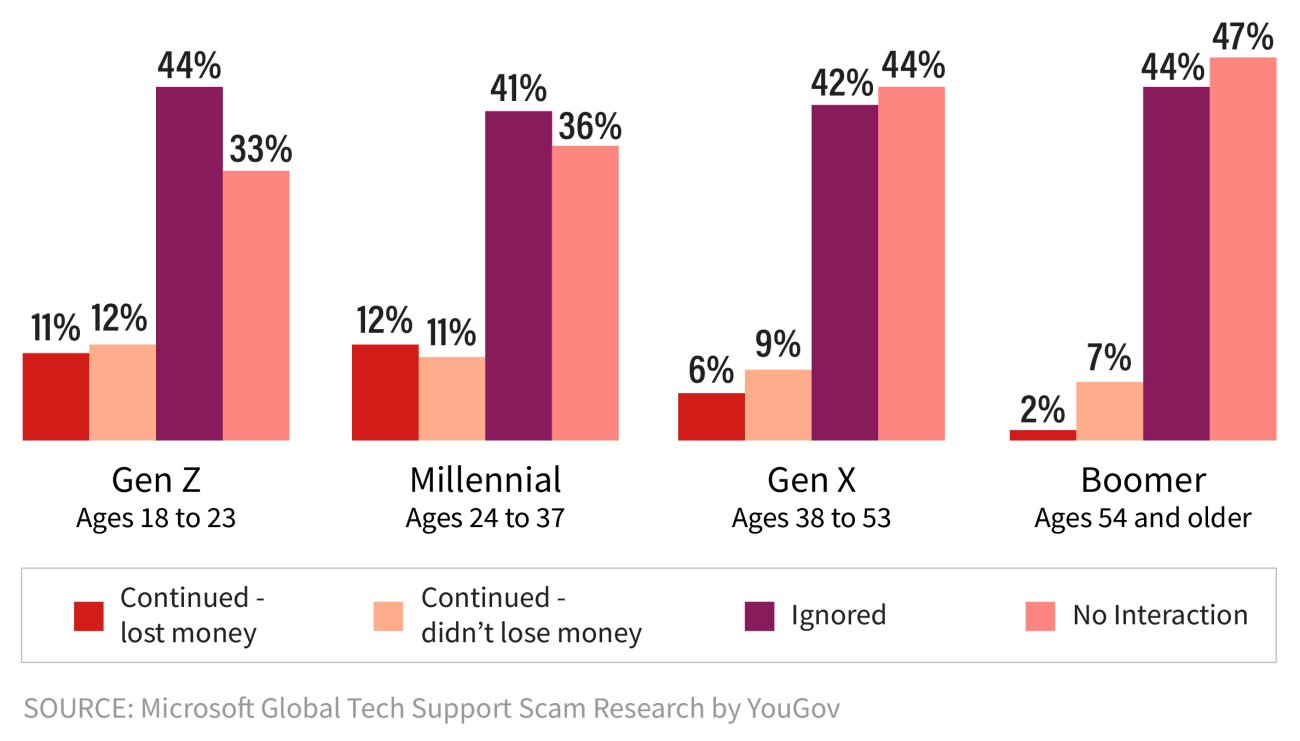Cagey Seniors Fall for Tech Support Scams Less Often than Younger Consumers

Tech support scams continue to infest the internet but a Microsoft survey finds that consumers aren’t falling for the scams as readily as they once did. In particular, baby boomers are less likely to get roped in than younger consumers.
To put it bluntly, it appears to be overconfident younger men who are most likely to engage with scammers while their cagier parents and grandparents wisely ignore the attempted con jobs. Of those surveyed, Gen Zers (aged 18-23) and Millennials (aged 24-37) were found to have continued interactions most when targeted with the scams – 23% for both age groups.
Microsoft’s 2021 Global Tech Support Scam Research report found an overall decline in scam encounters from the previous year – with three out of five consumers (59%) being targeted by tech support scammers in the last 12 months, down from 64% the previous year.
One in six consumers (16%) were tricked into continuing with the scam, a three-point decrease from 2018.
“Tech support scams are perpetrated globally and target people of all ages. While we do see progress made in the percentage of people who declined to engage with the scammers, there is continued need to monitor and address how the attacks are evolving,” said Mary Jo Schrade, Assistant General Counsel, Regional Lead, Microsoft Digital Crimes Unit Asia, in a news release.
“Tactics used by fraudsters to victimize users online have evolved over time, from pure cold calling to more sophisticated ploys, such as fake ‘pop-ups’ displayed on people’s computers,” she said.
Younger consumers more vulnerable to tech support scams

The study found that younger consumers are not only more likely to engage with scammers but also more likely to lose money as a result.
Globally, one out of 10 Millennials and one out of 10 Gen Zers that encountered a scam fell for it and lost money, the study found. This is correlated to the higher engagement that younger people have with riskier online activities, such as using torrent sites (16% for Gen Z; 15% for Millennials) and sharing email addresses in exchange for content (30% for Gen Z; 28% for Millennials).
Males were likely to be the hardest hit and most likely to have lost money as a result of such scams. 20% of males globally continued with such tech support scams in 2021, with half of them losing money as a result. In contrast, 13% of females globally continued with such tech support scams, with about one in three losing money in the interaction.
Avoiding tech support scams
Microsoft has these tips for anyone getting a call or pop-up notice from someone claiming to be from Microsoft or any other reputable company:
- Be suspicious of pop-up messages on your computer, and do not call the number or click on the link in any pop-ups received.
- Download software only from official company websites. Be wary of downloading software from third-party sites, as some of them might have been modified without the company’s knowledge to bundle support scam malware and other threats.
- If you think you may have been the victim of a Tech Support Scam, report your experience at www.microsoft.com/reportascam and also file reports with law enforcement authorities, such as your local consumer protection authority.
Tech support complaints pour in
Each month, Microsoft receives about 6,500 complaints globally from people who have been the victim of a tech support scam – down from 13,000 reports in an average month in prior years.
About 1,000 U.S. adults answered the Microsoft survey, conducted in May by YouGov, a British internet-based market research firm that also tapped the experiences of about 1,000 adults in each of these foreign countries: Australia, Brazil, Canada, Colombia, Finland, France, Germany, India, Japan, Mexico, Netherlands, Singapore, Spain, Switzerland and the United Kingdom.
It’s a follow-up to similar surveys that Microsoft fielded in 2018 and 2016.
